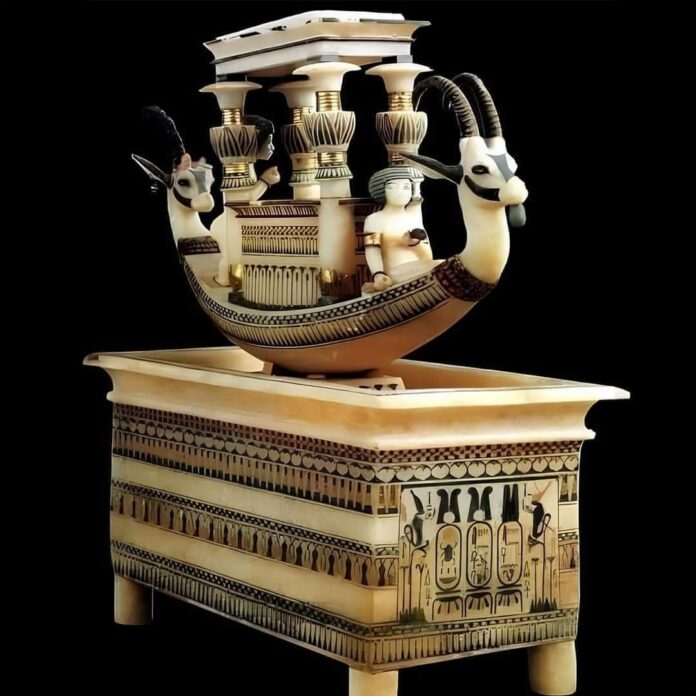In the treasure-laden tomb of Tutankhamun, among countless precious artifacts, lies a masterpiece that continues to intrigue historians and art enthusiasts alike – the Alabaster Boat. This remarkable piece, discovered by Howard Carter in 1922, stands as a testament to the extraordinary craftsmanship of ancient Egyptian artisans.
The Discovery That Stunned the World

When Howard Carter first entered the annex of Tutankhamun’s tomb, he found this exquisite alabaster sculpture delicately wrapped in flower garlands. The boat, supported by a square, pool-shaped foundation, immediately caught his attention, though its true purpose remained elusive. Carter proposed an enchanting theory – perhaps the basin was meant to be filled with water, creating the mesmerizing illusion of a boat floating on a serene surface.
A Marvel of Ancient Craftsmanship
The Mystical Ibex Guardians

The boat’s most striking features are its bow and stern, masterfully carved to depict ibexes facing the same direction. These magnificent creatures, with their pierced ears (one still bearing its original earring) and authentic ibex horns, demonstrate the ancient craftsmen’s dedication to authenticity. The ibex at the prow even retains its distinctive beard, showcasing the artisans’ remarkable attention to detail.
The Diminutive Helmsman

At the stern, an intriguing figure emerges – a naked dwarf serving as the boat’s helmsman. This unique character, adorned with armbands, wristbands, and a carefully styled wig, grasps a pole, eternally guiding this mystical vessel through time.
The Elegant Lady of the Bow

Under an ornate canopy supported by four graceful columns sits a female figure, the epitome of ancient Egyptian elegance. Her attire speaks of luxury – golden earrings, an armlet, and a delicate bead bracelet adorn her form. In her left hand, she holds a stained ivory lotus, while her wig, crafted from grey stone, completes her regal appearance.
Beyond Beauty: Symbolism and Significance

Dating back to the New Kingdom’s late 18th Dynasty (ca. 1332-1323 BC), this masterpiece transcends mere decorative purpose. The combination of authentic ibex horns, intricate carvings, and royal inscriptions suggests deep connections to both the natural and divine realms. The boat’s detailed inscriptions, featuring Tutankhamun’s throne names, firmly establish its royal heritage.
A Legacy Preserved

Today, visitors to the Egyptian Museum in Cairo (JE 62120) can marvel at this extraordinary piece. Whether it served as an unguent bottle, a perfume holder, or a ceremonial centerpiece, the Alabaster Boat remains one of the most captivating artifacts from Tutankhamun’s tomb, embodying the artistic excellence and symbolic complexity of ancient Egyptian civilization.
Through its meticulous craftsmanship and mysterious purpose, the Alabaster Boat continues to sail through time, carrying with it the secrets and splendor of a golden age in human history.

